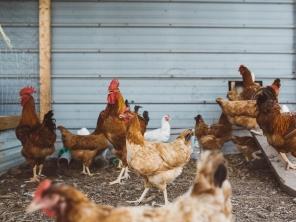
New measures come into force on 14 December that legally require all keepers to house their birds inside, to limit the spread of avian flu.
These measures – which apply whether birds are kept commercially or as pets – are in addition to the strengthened biosecurity regulations brought in on 11 November 2020 as part of the Avian Influenza Protection Zone (AIPZ).
They have been introduced in response to an increasing number of recent confirmed cases of avian flu across the UK, including in North Yorkshire and Leicestershire.
Poultry and captive bird keepers can help prevent avian flu by maintaining good biosecurity on their premises, including:
- housing or netting all poultry and captive birds
- cleansing and disinfecting clothing, footwear, equipment and vehicles before and after contact with poultry and captive birds – if practical, use disposable protective clothing
- reducing the movement of people, vehicles or equipment to and from areas where poultry and captive birds are kept, to minimise contamination from manure, slurry and other products
- using effective vermin control
- thoroughly cleaning and disinfecting housing at the end of a production cycle
- keeping fresh disinfectant at the right concentration at all points where people should use it, such as farm entrances and before entering poultry and captive bird housing or enclosures
- minimising direct and indirect contact between poultry/captive birds and wild birds, including making sure all feed and water is inaccessible to wild birds.
Keeper are also advised to register poultry, even pets, so Defra can contact them during an outbreak. Registration is a legal requirement for keepers with 50 or more birds.
Rotherham Council’s Assistant Director of Community Safety and Street Scene, Tom Smith, said: “Whilst there are currently no confirmed cases of Avian Flu in Rotherham, we are asking people who keep birds to take steps to keep it that way.
“If you keep poultry - as pets in your garden, commercially on a farm, or rearing game birds - you should maintain good biosecurity at all times and keep a close watch for signs of disease. If you have any concerns about their health, seek prompt advice from your vet.
“Public health advice is that the risk to human health from avian flu is very low, and food standards bodies advise that these viruses pose a very low food safety risk for UK consumers, and do not affect the consumption of poultry products, including eggs.”
The new housing measures will be kept under regular review as part of the government’s work to protect flocks.
Keepers should familiarise themselves with Defra’s detailed avian flu advice at www.gov.uk/guidance/avian-influenza-bird-flu
